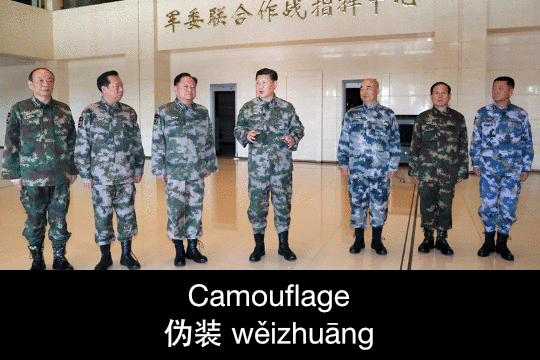Ready for fighting and flattery – China’s latest top news
Jeremy Goldkorn’s selection of the top stories from China on November 3, 2017. Part of the daily The China Project newsletter, a convenient package of China’s business, political, and cultural news delivered to your inbox for free. Subscribe here.

Xi Jinping: ‘Our army must be prepared to fight wars and win wars’
Xinhua News Agency’s top story today in Chinese and English is about a visit by Xi Jinping — president, Party general secretary, and chairman of the Central Military Commission (CMC) — to the CMC joint battle command center. Wearing camouflage, Xi made a speech that emphasized one of his key themes whenever he discusses the military: that the People’s Liberation Army (PLA) must be prepared to fight and win wars.
Trump to be flattered by king of China
U.S. President Donald Trump departs today for his Asia tour:
- Agence France-Presse reports that “Trump has decided at the last minute to extend a marathon trip to Asia, after criticism that he was expected to miss the East Asia Summit, a key meeting between Asean and eight of its partners.”
- He will visit Japan, where The Economist says (paywall) he will be treated with flattery: “Trump will learn that Tokyo’s department stores have stocked (exorbitantly marked-up) bottles from his Virginia winery to honor the visit,” while South Korea is also preparing for a state “with all the trimmings.” The Economist predicts that “flattery will prevail” in China, too, where Trump will get “a reception fit for a monarch.”
- Trump will be expecting royal treatment: Last week, he called Xi Jinping “the king of China.”
- Cui Tiankai 崔天凯, Chinese ambassador to the U.S., called the plans for Trump’s welcome a “state visit-plus” — reflecting a clear understanding of Trump’s need to gild lilies.
- Ely Ratner of the Council on Foreign Relations writes that the “visit will be long on ceremony and short on substance” and of “peculiar irrelevance to the future direction of U.S.-China policy.”
- The Associated Press reports that “White House officials and even the president himself are steering clear of” the term Asia-Pacific, and using Indo-Pacific instead “to propagate the idea that it’s a region that stretches far beyond China’s backyard and the tiger economies of East Asia.”
- Trump’s entourage in China will include executives from a number of energy and industrial companies such as General Electric, Honeywell, and Boeing, but according to Reuters, Lloyd Blankfein of Goldman Sachs is the only CEO of a major financial firm on the list.
- As we noted on October 31, the geopolitical picture has shifted in North Asia, with the apparent rapprochement of South Korea and China.
Much of the media commentary on the upcoming visit is focused on Trump’s weakness and Xi’s strength:
- Eurasia Group president Ian Bremmer writes that Trump will arrive in Beijing “at a moment when China, not the U.S., is the single most powerful actor in the global economy.”
- David Rothkopf, former editor of Foreign Policy, says that if Trump’s visit proves to be “‘historic,’ as he predicted on social media, it will be because it is the first in which an American president discovers he has traveled all the way to Beijing to meet with the most powerful man in the world.”
R.I.P. ‘Shanghaiist’
Hong Kong Free Press reports: “The Shanghaiist English-language news and culture blog has been shut down and its content removed from the internet after 12 years. U.S. operator DNAinfo closed its eight global city websites a week after writers at its New York branch voted to unionize.”
Three fun things
- Author Zhang Wei 张威, born in 1981, has made millions from his online fantasy novels published under the name Tangjia Sanshao 唐家三少. The Washington Post reports that while on a trip to Switzerland with his mother, he spent $10,000 on a glass of whisky, which turned out to be fake. The hotel returned the money.
- Translator Liz Carter has created “Chinese history — four characters at a time,” an editable compilation of four character phrases for Chinese historical events, policies, and movements.
- The Australian Strategic Policy Institute has published an infographic showing the location of users who “liked” the “Xi’s Visit” Facebook page. The top three countries are India, Pakistan, and Myanmar, which happen to be countries where many click farms operate.






